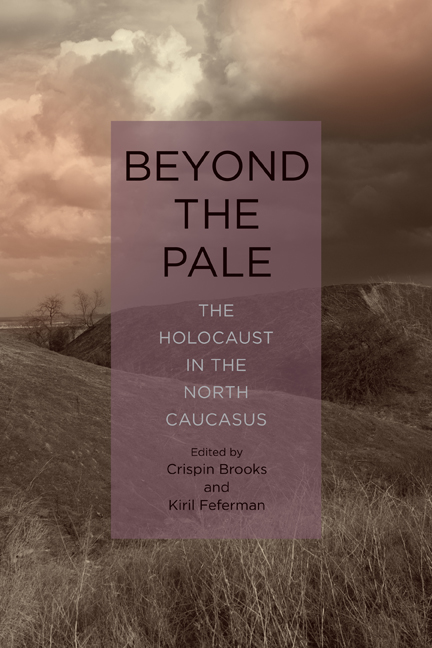Book contents
- Frontmatter
- Contents
- List of Illustrations
- Acknowledgments
- List of Abbreviations
- Note on Terminology
- Introduction
- 1 The Caucasus: A Rock in the Grinding Wheels of World History
- 2 Dwelling at the Foot of a Volcano? Jewish Perspectives on the Holocaust in the North Caucasus
- 3 “Operation Blue,” Einsatzgruppe D, and the Genocide in the Caucasus
- 4 The Kaukasier Kompanie (“Caucasian Company”): Soviet Ethnic Minorities, Collaborators, and Mass Killers
- 5 Mass Executions in Krasnodar Krai: Cross-Checking Sources for the Holocaust in the North Caucasus
- 6 In the Shadow of “Mass Treason”: The Holocaust in the Karachai Region
- 7 Rescue and Jewish-Muslim Relations in the North Caucasus
- 8 “We Were Saved Because the Occupation Lasted Only Six Months”: (Self-)Reflection on Survival Strategies during the Holocaust in the North Caucasus
- 9 The Holocaust on Soviet Territory—Forgotten Story? Individual and Official Memorialization of the Holocaust in Rostov-on-Don
- Glossary
- Bibliography
- List of Contributors
- Index
1 - The Caucasus: A Rock in the Grinding Wheels of World History
Published online by Cambridge University Press: 06 October 2020
- Frontmatter
- Contents
- List of Illustrations
- Acknowledgments
- List of Abbreviations
- Note on Terminology
- Introduction
- 1 The Caucasus: A Rock in the Grinding Wheels of World History
- 2 Dwelling at the Foot of a Volcano? Jewish Perspectives on the Holocaust in the North Caucasus
- 3 “Operation Blue,” Einsatzgruppe D, and the Genocide in the Caucasus
- 4 The Kaukasier Kompanie (“Caucasian Company”): Soviet Ethnic Minorities, Collaborators, and Mass Killers
- 5 Mass Executions in Krasnodar Krai: Cross-Checking Sources for the Holocaust in the North Caucasus
- 6 In the Shadow of “Mass Treason”: The Holocaust in the Karachai Region
- 7 Rescue and Jewish-Muslim Relations in the North Caucasus
- 8 “We Were Saved Because the Occupation Lasted Only Six Months”: (Self-)Reflection on Survival Strategies during the Holocaust in the North Caucasus
- 9 The Holocaust on Soviet Territory—Forgotten Story? Individual and Official Memorialization of the Holocaust in Rostov-on-Don
- Glossary
- Bibliography
- List of Contributors
- Index
Summary
This chapter seeks to provide a substantive answer to the simple question, What is the Caucasus? As with all such ostensibly simple questions, the answers tend to become complex and far from short. In order to keep it reasonably brief and still meaningful, the answer would have to be impressionistic yet undergirded by whole batteries of theories relegated to footnotes. I cannot engage here either the legacies of classical Orientalism, the numerous recent commentaries on post-Soviet wars, or the impressively growing bodies of academic research in anthropology and literary studies. For those seeking more detail, several superbly written overviews of the region are now available in English. A singular achievement is the historical atlas produced by the Ossetian scholar Artur Tsutsiev, who succeeded in mapping the ethno-constructivist perspective of Benedict Anderson onto the landscape and longue duree structures of Fernand Braudel. This chapter rather takes the angle of historical sociology, which its doyen Charles Tilly expressed in a monograph title of unbeatable brevity: Why?
One may notice from the titles already cited that in the West the prevalent associations with the Caucasus are imperial conquest and ferocious native resistance as well as the amazing resilience shown by the myriad of its peoples over the centuries. In fact, the Caucasus is far from merely another “bloodlands” at the distant reaches of Eastern Europe and the Middle East. This volume, among other things, documents examples of empathy and humanity even in the darkest times. It is also our Caucasus.
In many respects, the region may seem downright incredible, beginning with its fabled customs and ethno-linguistic diversity. Here we discover the little-known parallels and echoes of historical processes first evolving in the cradles of civilization, in Mesopotamia and ancient Greece as well as the nomadic Great Steppe. Later in time, the Caucasus came to play a wonderfully disproportionate role in shaping Russian politics, culture, even cuisine and popular humor. (Look up for starters the once legendary jokes attributed to “Radio Yerevan.”) In the nineteenth century, the Caucasus captivated such giants of Russian literature as Aleksandr Pushkin, Mikhail Lermontov, and Leo Tolstoy. In the transformative and extreme twentieth century, various Caucasians sided with the Bolsheviks during the Russian Civil War, and quite a few rose to the topmost positions in Moscow. After all, Stalin himself was an ethnic Georgian.
- Type
- Chapter
- Information
- Beyond the PaleThe Holocaust in the North Caucasus, pp. 25 - 47Publisher: Boydell & BrewerPrint publication year: 2020



